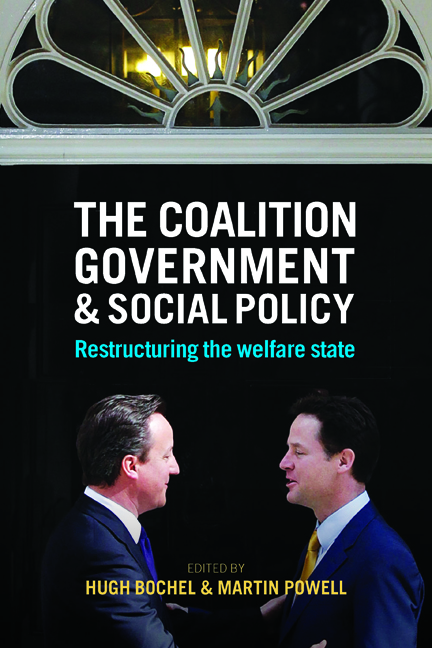Book contents
- Frontmatter
- Contents
- Notes on contributors
- One The transformation of the welfare state? The Conservative–Liberal Democrat coalition government and social policy
- Two The coalition government, public spending and social policy
- Three The changing governance of social policy
- Four The coalition, social policy and public opinion
- Five Health policy and the coalition government
- Six The coalition government, the general election and the policy ratchet in education: a reflection on the ‘ghosts’ of policy past, present and yet to come
- Seven Coalition housing policy in England
- Eight Social security under the coalition and Conservatives: shredding the system for people of working age; privileging pensioners
- Nine Welfare and active labour market policies in the UK: the coalition government approach
- Ten ‘It ain’t what you do, it’s the way that you do it’: adult social care under the coalition
- Eleven Family policy: the Mods and Rockers
- Twelve One step forward, two steps back: children, young people and the Conservative–Liberal Democrat coalition
- Thirteen The coalition and criminal justice
- Fourteen Equalities: the impact of welfare reform and austerity by gender, disability and age
- Fifteen Social policy, the devolved administrations and the UK coalition government
- Sixteen Conclusions
- Index
Eleven - Family policy: the Mods and Rockers
Published online by Cambridge University Press: 01 September 2022
- Frontmatter
- Contents
- Notes on contributors
- One The transformation of the welfare state? The Conservative–Liberal Democrat coalition government and social policy
- Two The coalition government, public spending and social policy
- Three The changing governance of social policy
- Four The coalition, social policy and public opinion
- Five Health policy and the coalition government
- Six The coalition government, the general election and the policy ratchet in education: a reflection on the ‘ghosts’ of policy past, present and yet to come
- Seven Coalition housing policy in England
- Eight Social security under the coalition and Conservatives: shredding the system for people of working age; privileging pensioners
- Nine Welfare and active labour market policies in the UK: the coalition government approach
- Ten ‘It ain’t what you do, it’s the way that you do it’: adult social care under the coalition
- Eleven Family policy: the Mods and Rockers
- Twelve One step forward, two steps back: children, young people and the Conservative–Liberal Democrat coalition
- Thirteen The coalition and criminal justice
- Fourteen Equalities: the impact of welfare reform and austerity by gender, disability and age
- Fifteen Social policy, the devolved administrations and the UK coalition government
- Sixteen Conclusions
- Index
Summary
Introduction
Conservative–Liberal Democrat coalition government family policy was characterised by, on the one hand, a social and economic liberalism subscribed to by both the Conservatives and Liberal Democrats, and, on the other, a traditional moralism championed by many Conservatives. It was informed by battles and uneasy alliances of political perspectives that The Times (1998) once referred to as ‘The Tory Mods and Rockers’, with the former embracing a ‘modernising’ and investment agenda for change and the latter seeking to conserve established doctrines. In coalition family policy, Mod and Rocker tensions and alliances can be demonstrated in the socially liberal opening up and moral universalisation of marriage, and the economically liberal and morally categorical dividing off of particular sorts of families as in need of targeted early or turnaround intervention to turn them into responsible worker-citizens (see Table 1.1 in Chapter One). Under the coalition government, families became a cipher for the state of British society generally. There were ‘hard-working families’, and the other sort: the shirker and scrounger families of Broken Britain who had lived off welfare benefits for generations rather than get a job, where parents had no idea how to bring up their young children properly, and neither knew nor cared what their feral teenage children were up to, leaving them free to truant and riot. These distinctions appear repeatedly in this book (see, eg, Chapters Eight, Nine and Twelve).
These images underpinned a range of developments in coalition government policy, and specifically in family policy, as we consider here. While hard-working families were lauded and received some rhetorical pats on the back (in practice, they became hard-hit by policy developments), the policy prescription for supposed shirkers and scroungers conjured poverty into the fault of poor families themselves through asserting their intergenerational culture and biological deficit as causal in their disadvantage. Attention was drawn away from broader structural and economic risks facing families. A seemingly progressive and moral focus on improving the lives of children and families to the benefit of society has been subject to party-political consensus. Although there were some differences with the previous New Labour government's policies towards disadvantaged families, in the coalition's preoccupation with targeting, the main thrust has been strong continuities and extrapolations (Bond-Taylor, 2015a).
- Type
- Chapter
- Information
- The Coalition Government and Social PolicyRestructuring the Welfare State, pp. 243 - 264Publisher: Bristol University PressPrint publication year: 2016

